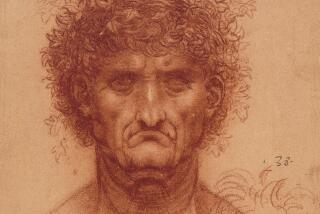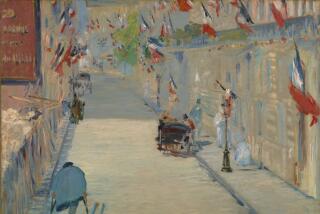MOVIE REVIEW : Pialat’s ‘Van Gogh’: Strokes of Genius
- Share via
In some ways, the great Dutch painter Vincent van Gogh has become an artistic saint: symbol of the pure genius’s melancholy fate in the hands of a foolish and mercenary world. But that myth is exactly what French director Maurice Pialat doesn’t want to feed us in his new “Van Gogh” (Nuart). Pialat, a painter himself, takes a more materialist view of the artist’s passion and dilemma.
Just as he begins by letting us see and hear the scratch of brush on canvas, he wants us to feel the reality of Van Gogh’s misery: his toil, his illness, his sense of rejection. And while he’s portraying and embroidering the painter’s most terrible two months, he doesn’t sentimentalize him. Playing the title character, Jacques Dutronc, an actor-singer once known as France’s Bob Dylan, projects an almost supernal sullenness: harsh, isolated.
It’s a stinging performance, centerpiece of an extraordinary film, but it doesn’t hit any of the usual notes. Not the magnetic, aggressive sensitivity of Kirk Douglas in “Lust for Life,” or John Hurt’s splendidly tormented readings in Paul Cox’s “Vincent.” Even more than Tim Roth in “Vincent and Theo,” this is a dour, clenched portrayal. As Dutronc wanders through the streets, fields and lake paths of Auvers-sur-Oise, where the real Van Gogh created more than a hundred paintings during the last 67 days of his life, he seems a misanthrope with an easel.
He insults his patron, Dr. Gachet (Gerard Sety), and seduces Gachet’s daughter Marguerite (Alexandra London). He quarrels with brother Theo (Bernard Le Coq), his only financial supporter, manhandles Theo’s wife (Corinne Bourdon) and threatens to throw his paintings out their window. He drinks, whores, dances, carouses and does mean impersonations of Toulouse-Lautrec. Bone-weary and soul-shaken, he’s a man self-exiled, existing only for the ecstatic moments of his brush strokes.
It’s ironic that a figure so apparently abject--a loveless Bohemian living among the poor, suffering from syphilis during most of his creative years, able to sell only one painting in his lifetime (though his brother-benefactor was an eminent Parisian art dealer), and dead at 37 of a self-inflicted gunshot wound--should become so revered a century afterward. And not just for his magnificent art, but for that miserable life.
Unlike Minnelli, Altman or Akira Kurosawa (in “Dreams”), Pialat makes no attempt to reproduce any feverish Van Gogh pictorial effects in his own compositions: no mad whirling sunlight, no hot blazes and whorls. Only rarely do we see Van Gogh’s paintings; he labors briskly or tucks them thoughtlessly under his arms. His attitude is wary, his demeanor grumpy. Only rarely does he suggest the Van Gogh revealed in his letters and paintings; more often, he reminds you of that occasional movie actor Pialat himself.
The life, not the art, is what Pialat wants. And he makes us feel it. As a director, he’s a master of the spontaneous moment, the un-self-conscious act. There’s a cool rigor to his portrayal of outsiders in “Loulou,” “A Nos Amours” and “Police,” and even in his 1987 Cannes Grand Prize winner, “Under the Sun of Satan,” he presented spirituality, resurrection and an encounter with the devil in the same seemingly grim, clinical tone.
Here, in “Van Gogh” (rated R for sensuality and language), Pialat and a remarkable cast convey something of the giddy pain of a life burning passionately over an abyss. We flatter ourselves that if we were around in 1890, we would have recognized Van Gogh’s genius and changed his fate. But we probably wouldn’t have--just as we probably don’t recognize the Van Goghs among us now. In this sad, brilliant film, Pialat gives us a terrible inkling of why.
‘Van Gogh’
Jacques Dutronc-- Vincent van Gogh
Alexandra London-- Marguerite Gachet
Bernard Le Coq-- Theo van Gogh
Gerard Sety-- Dr. Gachet
A Sony Pictures Classics release. Director/screenplay Maurice Pialat. Producer Daniel Toscan Du Plantier. Cinematographers Emmanuel Machuel, Gills Henri, Jacques Loiseleux. Editors Yann Dedet, Nathalie Hubert. Costumes Edith Vesperini. Production design Philippe Pallut. Running time: 2 hours, 25 minutes.
MPAA-rated R (sensuality and language).
More to Read
Only good movies
Get the Indie Focus newsletter, Mark Olsen's weekly guide to the world of cinema.
You may occasionally receive promotional content from the Los Angeles Times.










